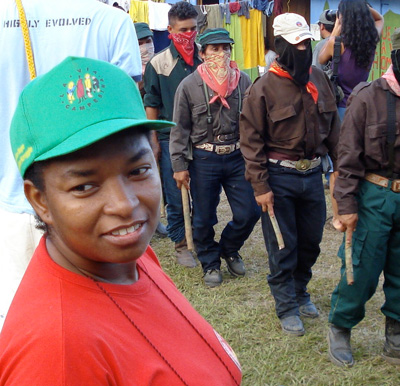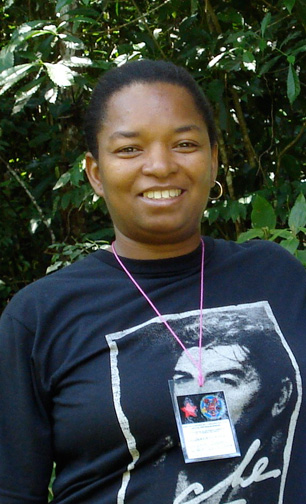Part of the Series
Birthing Justice: Women Creating Economic and Social Alternatives
Juana Ferrer is a member of the national board of National Confederation of Women Farmers (CONAMUCA) in the Dominican Republic. She also sits on three international committees of Via Campesina, an alliance of groups of small farmers, landless people, indigenous people, and rural women from 70 countries; they are the International Coordinating Committee, International Commission of Women, and Global Campaign to End All Forms of Violence against Rural Women.
One of Juana’s priorities in life is to end violence against small-farmer communities, especially the women within them. She and others in Via Campesina, together, are making slow but steady headway. As for physical violence against women, Via Campesina has made an aggressive commitment to eliminate it.
The coalition also challenges structural violence, the result of economic and political systems which systematically harm rural and landless peoples. One way is through aggressively promoting food sovereignty, which is the right of a nation to feed itself through domestic, small-scale, environmentally healthy agriculture. Instead of food serving the profits of global corporations, food sovereignty privileges the right of small farmers to own land and to produce. It is based in part on the democratic participation of the population in shaping food, trade, and development policies.
Juana Ferrer |San Cristobal, Dominican Republic
 (Photo: Peter Rosset)Women have historically been promoters of agriculture and the ones who saved seeds, too. We women have a very spiritual and very political commitment that’s been passed down to us by our ancestors – a commitment to better conditions for our families, our community, our people.
(Photo: Peter Rosset)Women have historically been promoters of agriculture and the ones who saved seeds, too. We women have a very spiritual and very political commitment that’s been passed down to us by our ancestors – a commitment to better conditions for our families, our community, our people.
We face really harsh realities with the food crisis and the environmental crisis. It affects us all, but especially the women. We women carry it all on our shoulders, but it’s not just our responsibility. We’ve had to unite women and men to provide solutions to our situations. We’ve had to work really hard.
In the early 90’s, when we were building Via Campesina, women’s participation – especially at the international level – was practically invisible. We women came with all our commitment, with all our history in [social] movements, but it wasn’t reflected in the organization or their decision-making.
A lot of the women that helped start the movement were pregnant. Imagine that. We were nursing children while giving all we could in our local, national, and
international political work. Some people might think that’s marvelous, but the level of sacrifice each of us had to make was very big. We had the double burden of raising a family and doing political work.
A really important thing for us has been valuing our responsibilities, because it’s not the same when a woman goes out to struggle: we have to make breakfast for the children, make coffee, clean the house, see if Grandmother is doing okay. The men go out anywhere they want.
In the course of it all, we women have gained more of a place in our houses, in our families, in our communities, and in our organizations. But it’s not like everything is fine now. And it’s not because the men in the organization gave us space; we’ve worked for it.
We in Via Campesina assume that food sovereignty is our right as peoples. We have the right to have access to resources, to produce the food we need, to decide what we want to produce. Women are present in that struggle.
The seed campaign of Via Campesina, for example, was primarily introduced by the women. All that has to do with human rights, rights of the campesinos and campesinas [small farmers]. Women have taken so much responsibility in confronting the neoliberal economic and agriculture model and constructing the international campesino movement that our men in Via Campesina have had to recognize it.
One of the things we do in Via Campesina is oppose a culture of patriarchy, discrimination, and oppression. We’ve been able to plant the struggle against all the things that oppress us women as a responsibility of women and men in Via Campesina. Like: Via Campesina originally had a Commission on Gender, but it was all women while all the rest of the commissions – agrarian reform, food sovereignty, human rights, and others – were only men. Now we have an International Commission on Women, with men and women in it. On the International Coordinating Committee, we’re nine men and nine women. But what we’ve struggled for isn’t equality in numbers, but in participation and decision-making.
In 2005, Via Campesina launched a campaign to eliminate all forms of violence against women in rural areas, and to work with other sectors of society to do it. It’s not a question of improving the situation of violence; it’s about eliminating it. We’ve gotten the men in Via Campesina to put their money where their mouth is, because they’ve figured out that violence against women directly affects the whole family – daughters and sons, too. Our position is that the government has to assume responsibility, too.
At the international level of Via Campesina, one achievement has been to get women’s right to access to land recognized, to fight for an agrarian reform that benefits men and women. In some countries like the Dominican Republic, our struggle, our debate, and our alliances with other movements have won us a reform of the agrarian code. Before, women only had access to the land when the husband died, and then only if there wasn’t a brother in the family. Since we got this law passed, women are equal to men in access to land, credit, and other resources. Clearly there’s a problem in applying this law; women are still discriminated against.
And then, campesinos and campesinas have little access to productive land with access to water, where we can grow food, to begin with. The rest is in the hands of big producers, multinationals, politicians, government functionaries.
We’ve achieved a lot, not just in words but also in action. We’ve provided a lot of solutions to human rights violations that women face – violence within families, economic violence, political violence.
Thanks to Sylvia Gonzalez for translating this interview. Photos by Peter Rosset.
To learn more about Juana Ferrer’s organization, Via Campesina, please see www.viacampesina.org/en.
Inspired? Here are a few suggestions for getting involved!
- Research how businesses, restaurants and corporations treat their workers and choose your patronage accordingly. Begin with the Restaurant Opportunity Center Diner’s Guide 2012 (rocunited.org/dinersguide).
- Participate in boycotts called by farmworkers and restaurant workers to win improved working conditions.
- Join up with national campaigns like the Restaurant Opportunity Centers United (www.rocunited.org) and the Student/Farmworker Alliance, which works in collaboration with the Coalition of Immokalee Workers (www.sfalliance.org).
- The US Food Sovereignty Alliance brings together food justice initiatives to organize for domestic food sovereignty and link up with the global movement for food sovereignty. Consider having your organization join (www.usfoodsovereigntyalliance.org).
- Buy your food from a CSA (community supported agriculture) farm or farmers’ market in your community. Local Harvest maps out CSAs, farmers markets, family growers, and other sources of sustainable food in the United States (www.localharvest.org).
- If you participate in a CSA, explore ways to make it more affordable. Create a sliding payment scale or a cross-subsidy system, where people with lower incomes are subsidized by those with higher incomes. Many CSA’s also accept food stamps. For more ideas, read Just Food’s “Strategies to Increase Mixed-Income CSA Participation” (www.justfood.org/csa/strategies-increase-mixed-income-csa-participation).
- Support local land trusts to preserve open land for growing food. Land trusts are non-profits that conserve land, often for recreation, permanently affordable housing or agricultural use (www.findalandtrust.org).
And check out the following resources and organizations:
- National Family Farm Coalition, www.nffc.net
- Food First, www.foodfirst.org
- Food Chain Workers Alliance, www.foodchainworkers.org
- Family Farm Defenders, www.familyfarmers.org
- Grassroots International, www.grassrootsonline.org
- Agricultural Missions, www.agriculturalmissions.org
- Fair Food Network, www.fairfoodnetwork.org
- Urban Lifeways Network, www.nativemovement.org
- National Sustainable Agriculture Information Service, www.attra.ncat.org
- The Institute for Local Self-Reliance, www.ilsr.org
- International Indian Treaty Council, The Right to Food, www.treatycouncil.org/new_page_5241.htm
- New Farm of the Rodale Institute, www.rodaleinstitute.org/new_farm
- Path to Freedom, www.pathtofreedom.com
- Food Research and Action Center, www.frac.org/federal-foodnutrition-programs
- Women, Food, and Agricultural Network, www.wfan.org
- Institute for Agriculture and Trade Policy, www.iatp.org
- White Earth Land Recovery and Native Harvest Online Catalog, www.welrp.org & www.nativeharvest.com
- Via Campesina’s Food Sovereignty and Trade webpage, www.viacampesina.org/en
- National Family Farm Coalition and Grassroots International, Food Sovereignty, available online at: www.grassrootsonline.org/publications/fact-sheets-reports/food-sovereign…
- Peter Rosset, “Tide Shifts on Agrarian Reform: New Movements Show the Way”, Food First Backgrounder, 2001, available online at: www.tinyurl.com/tideshifts
- Peter Rosset, Food Is Different (Zed Book, 2006)
- Vandana Shiva, Earth Democracy: Justice, Sustainability, and Peace (South End Press, 2005)
- “The Future of Food,” directed by Deborah Koons Garcia, Lily Films, 2009, available online at: www.thefutureoffood.com
Join us in defending the truth before it’s too late
The future of independent journalism is uncertain, and the consequences of losing it are too grave to ignore. To ensure Truthout remains safe, strong, and free, we need to raise $31,000 in the next 48 hours. Every dollar raised goes directly toward the costs of producing news you can trust.
Please give what you can — because by supporting us with a tax-deductible donation, you’re not just preserving a source of news, you’re helping to safeguard what’s left of our democracy.

